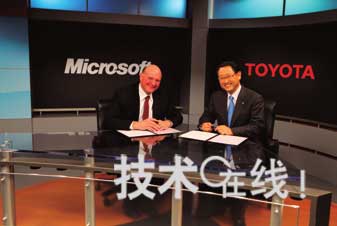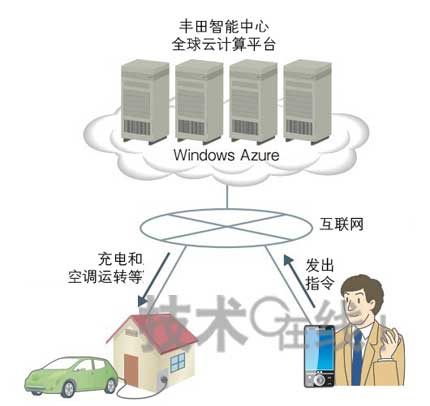Toyota Motor and Microsoft of the United States have established a strategic cooperative relationship in the field of next-generation automotive information provision services (in-vehicle intelligent communication services). Both parties will jointly develop information management services for plug-in hybrid electric vehicles (PHEV) and electric vehicles (EV), etc., which can confirm the remaining charge of the rechargeable battery and set the charging time through the smartphone. The two companies plan to invest a total of 1 billion yen in Toyota Media Service, a wholly-owned subsidiary of Toyota Motor Corporation. First, on Microsoft's cloud computing platform "Windows Azure", it will build an intelligent communication service system for Toyota's PHEVs and EVs scheduled to be launched in 2012, and provide the service in Japan and the United States.

Toyota Motor Corporation ’s Representative Director President Akio Toyoda (right) and Microsoft CEO Steve Ballmer (left)
Yoshiro Yamayama, Managing Director of Toyota Motor Corporation and Representative Director of Toyota Media Services, said, "We will promote cooperation in accordance with the plan that we do not need to build our own IT infrastructure." Toyota will use this cooperation as an opportunity to hand over IT infrastructure operations to Microsoft and focus on application development. Youshan said, "We currently have data centers related to the 'G-BOOK' service in Japan, the United States and China. We will integrate these infrastructures with a new generation of in-vehicle intelligent communication service platforms in due course."
 Figure 1: Toyota and Microsoft describe the linkage service between cars and smartphones
Figure 1: Toyota and Microsoft describe the linkage service between cars and smartphones Toyota Motor and Microsoft have collaborated to build an information linkage service for PHEV / EV that Toyota Motor will launch. You can check the remaining power of the rechargeable battery equipped in the car, switch the air conditioner, and set the charging time through connected products such as smartphones.
Toyota Motor decided to abandon its infrastructure and switch to cloud computing services for two reasons. One is to accelerate its entry into emerging markets. When selling PHEVs and EVs in emerging market countries, by effectively using cloud computing services, IT infrastructure can be built locally without spending time and money. Another reason is to allow other car manufacturers to easily join their own service platform. Therefore, the advantage of cloud computing is: as long as you pay a certain usage fee, you can use it conveniently without making upfront investment.
With the advent of PHEVs and EVs, in-vehicle intelligent communication platforms have entered the Warring States era, and all IT companies are involved. Hitachi Automotive Systems and Airbiquity of the United States have provided Nissan Motor's EV "LEAF" (Chinese name: Lingfeng) with a platform developed by both parties. The platform uses a multi-tenant method in which multiple car manufacturers can provide services through the same system, and strives to acquire other customers after Nissan. In May 2010, General Motors cooperated with Google in the United States to jointly develop a special service for PHEV "Volt". (Reporter: Asahi Naoki)
Cross Trainer,Elliptical Machine,Elliptical Cross Trainer,Body Power Elliptical
Zhejiang Kingdom Sports Co.,Ltd. , https://www.zjkingdomsports.com